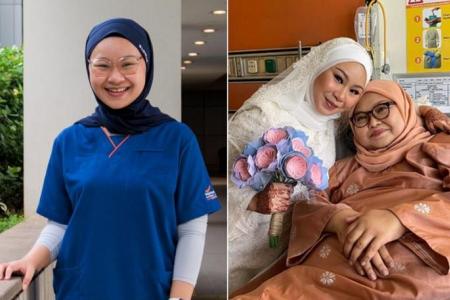‘She was such a fighter’: Terminally ill mother dies one week after daughter gets married in hospital
One of her late mother’s last wishes was to see her get married.
So in 2021, at the age of 25, Dr Aqilah Faaiqah Haji Shamsuri and her then-boyfriend of two years tied the knot in Singapore General Hospital, where her mother was warded and in the presence of their immediate families.
Her mother Madam Rahana Ali, who was battling late-stage ovarian cancer, passed on a week later.
“She was such a fighter. You would never think she was a dying woman. She was fighting for me. She wanted to see me graduate, get married and have children,” said Dr Aqilah, who is the only child.
But Dr Aqilah, who graduated on Saturday from the Yong Loo Lin School of Medicine in the National University of Singapore (NUS), knew better.
“I had to have that conversation with her to manage her expectations because I think through it all, she felt like she was going to get through it and go home soon. And that was the hope of the family as well,” she said.
As the main caregiver, she spent hours studying beside her mother’s hospital bed during her last days, which coincided with final exams in her fourth year.
“I wasn’t in the right mental frame to be preparing for my final exam. I didn’t even prepare for an entire chunk of a topic, which was paediatric speciality, or conditions relating to children,” she said.
“But thankfully before my exam, my clinical partner went through a few cases with me, and somehow one of those cases actually came out for the clinical exam. I feel like that’s what helped me pass.”
The journey to entering medical school was also a tumultuous one, as it was during her last year in Republic Polytechnic’s biomedical science course in 2016 that her mother received the cancer diagnosis.
“She had symptoms of anaemia, essentially getting more tired and breathless…Unfortunately, the cancer she had presents very late in patients,” said Dr Aqilah, who juggled studies with caregiving for her mother, who went through surgery and several rounds of chemotherapy.
Her father was working then as a private-hire driver to support the family financially.
Being accepted into medical school felt “surreal”, said Dr Aqilah, who attained a near-perfect grade point average (GPA) of 3.98 out of 4 for her diploma. “I felt like I couldn’t do what I thought was my best. The fact that I still got in was like a shock for all of us; I thought I had to get a perfect GPA to get in.”
Studying medicine felt like a natural choice, she said, as she enjoyed science from primary school and wanted to pursue a career where she could help others.
In her second year of medical school, her mother suffered from end-stage kidney failure and had to undergo dialysis three times a week.
A few months later, the family was told her mother’s cancer had returned. “That was the first time I saw my mum not really want to fight on so much,” said Dr Aqilah.
“Even though we felt like she tolerated the chemotherapy the first time so well, in reality, it was really very difficult for her. She was passed out on the bed most of the time because it was so tiring and painful, and she lost her hair, which affected her confidence.”
The family made the difficult decision to respect her mother’s wish to not undergo chemotherapy again.
“At the back of my mind as I was going through medical school, I knew my mother might not see me graduate,” said Dr Aqilah.
Eventually, the tumour grew near her mother’s back muscles, causing her great pain and sleeplessness. She also developed complications like deep-vein thrombosis, which occurs when a blood clot forms in a deep vein, typically in the legs.
A staycation to celebrate her mother’s birthday ended up in the hospital, where her mother experienced pain so severe she was in tears throughout the night.
At that point, chemotherapy was no longer an option, as her mother could not tolerate it.
NUS supported her by changing her clinical postings to the hospital that her mother was warded in, so that she could check in on her regularly.
A subsidy from Mendaki and other scholarships also covered her tuition fees and other expenses entirely.
She took a gap year from school in 2021 to look after her mother, who passed on in the same year. In honour of her mother, she named her online baking business “Ibu Roti” – “Ibu” (mother in Malay) was what she called her mother.
“I felt a bit lost, but thankfully I had my husband for support. It was really just trying to get back into the right mental space,” she said.
Because of her experience, palliative care is a field Dr Aqilah has an interest in.
“As a caregiver, I realised what kind of doctor a patient as well as the family wants – someone who takes the time to not just treat the disease itself, but look at the patient holistically,” she said.
This includes considering their socio-economic background when ordering tests or prescribing treatments, for example.
“Because my situation was not far off from that of many patients and families, I feel like I’m able to empathise better with them.”
The ordeal also made her stronger, she said. “When I look at my mother, she didn’t think that life was so unfair. She looked at every life challenge as more of a test of character.”
“There’s always a silver lining. When adversity happens, there’s always a rainbow at the end of it.”
Get The New Paper on your phone with the free TNP app. Download from the Apple App Store or Google Play Store now


